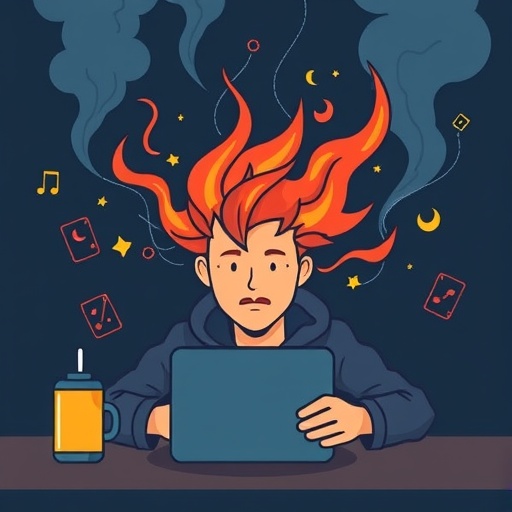In an era where digital technology pervades nearly every aspect of daily life, the psychological toll exerted by constant connectivity is becoming the focus of increasing scholarly attention. A pioneering study scheduled for 2025 publication in BMC Psychology dives deeply into the intricate dynamics linking digital burnout with academic procrastination. Researchers Savaş, Turan, and Asan explore not only the direct relationship between these phenomena but also unveil the crucial mediating influences of life satisfaction and fatigue, presenting a nuanced framework that could revolutionize our understanding of student behaviors in the digital age.
Digital burnout, characterized by emotional exhaustion, cynicism, and reduced efficacy resulting from excessive engagement with digital devices, has surged alarmingly in recent years. Particularly for students, the omnipresence of screens and online academic requirements blurs boundaries, leading to persistent overload. The new study advances the dialogue by empirically linking digital burnout to an increased tendency for academic procrastination, which describes delaying or postponing academic tasks.
Through a sophisticated methodological approach, the research team employed a comprehensive battery of psychometric assessments among diverse student cohorts to quantify digital burnout levels alongside procrastination behaviors. What sets this study apart is its incisive examination of mediators—life satisfaction and fatigue—that temporally and causally influence this relationship. Life satisfaction, a holistic measure of well-being and contentment with life circumstances, emerged as a protective factor, attenuating procrastinatory impulses even in the presence of digital burnout.
Meanwhile, fatigue, conceptualized beyond mere physical tiredness to encompass mental exhaustion and reduced cognitive energy, substantially mediated the pathway from burnout to procrastination. These findings underscore fatigue’s role as a debilitating intermediary that exacerbates delay behaviors in academic contexts. Essentially, as digital burnout intensifies, escalating fatigue undermines motivation and executive function, culminating in increased procrastination.
The implications of delineating these mediating variables are profound. Interventions focused solely on managing procrastination without addressing digital burnout and life satisfaction may only achieve superficial success. Instead, a holistic model informed by this study promotes strategies aimed at reducing digital overload, enhancing life satisfaction, and mitigating fatigue to break the procrastination cycle.
This research harnesses quantitative analyses augmented by structural equation modeling, enabling the dissection of complex causative and mediating effects. The robustness of this analytical framework strengthens confidence in the generalizability of the findings, offering a valuable template for future inquiries into related behavioral and psychological domains.
Moreover, the study contextualizes its findings within the larger discourse on mental health in higher education, where elevated stress levels coincide with escalating academic demands and technological immersion. By spotlighting digital burnout as a pivotal psychological stressor, the authors invite educational institutions, policymakers, and mental health professionals to reevaluate existing support infrastructures.
The study’s detection of life satisfaction as a stress-buffering moderator aligns with established psychological theories that posit well-being as a determinant of resilience. By promoting life satisfaction, whether through cognitive-behavioral interventions, lifestyle adjustments, or social support enhancement, there is potential to disrupt the hazardous trajectory from burnout to procrastination.
Importantly, the research also critiques prevailing digital habits and calls for conscientious technology use tailored to preserve cognitive resources. The nuanced differentiation of digital burnout from general fatigue elucidates the unique psychological demands imposed by digital environments, signaling a need for novel preventative measures and digital hygiene education.
The article’s timing is particularly vital given global shifts towards blended or entirely virtual learning models, where screen exposure and digital multitasking are ubiquitous. It also raises awareness of the hidden cost of technological convenience, advocating for balanced digital engagement as a cornerstone of academic success and psychological health.
Aside from individual-level implications, this study indirectly speaks to broader societal challenges. As digital tools integrate further into professional and personal lives, understanding and mitigating burnout-induced procrastination could enhance workforce productivity and overall life quality, transcending academic borders.
Future research avenues inspired by this work might involve longitudinal designs to track the temporal stability of these relationships or experimental studies probing the efficacy of targeted interventions. Cross-cultural validations could also reveal how sociocultural factors moderate these dynamics, given the global nature of digital technology use.
By elucidating the intricate psychological interplay revolving around digital burnout, academic procrastination, life satisfaction, and fatigue, this research offers a groundbreaking lens. It not only advances theoretical psychology but also proposes actionable insights for improving student well-being and academic performance amidst technological saturation.
In summary, the study represents a landmark in the burgeoning field of digital mental health research. It captures the multifaceted nature of students’ struggles with technology-driven stressors, offering a comprehensive understanding that challenges simplistic interpretations of procrastination. Through its meticulous analysis, the work heralds a new era of evidence-based strategies designed to heal and empower students navigating the digital labyrinth of modern education.
Subject of Research: The psychological relationship between digital burnout and academic procrastination, including the mediating roles of life satisfaction and fatigue.
Article Title: The relationship between digital burnout and academic procrastination and the mediating roles of life satisfaction and the fatigue in this relationship.
Article References:
Savaş, B.Ç., Turan, M. & Asan, S. The relationship between digital burnout and academic procrastination and the mediating roles of life satisfaction and the fatigue in this relationship. BMC Psychol 13, 1223 (2025). https://doi.org/10.1186/s40359-025-03510-5
Image Credits: AI Generated




